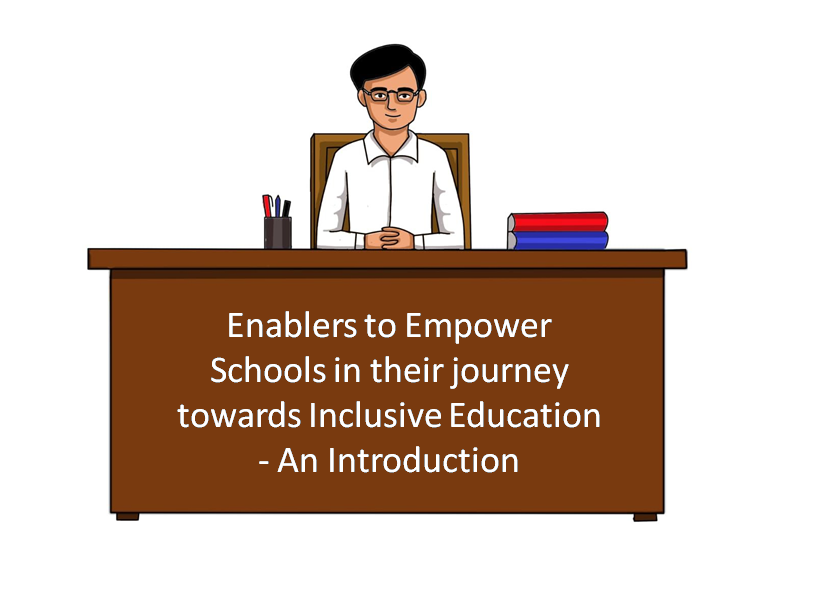
Enablers to Empower Schools-An Introduction
‘Education to all and for all Children’ has been one of the major watchwords at the core of Indian Education for decades. The National Education Policy 1968 and 1986 with RTE Act 2009 had led to some improvements relating to access and enrolment of children in schools in India. Thus, education of children with disabilities in India, as all over the world, has moved from exclusion to segregation in special schools to integrated education and now to inclusive education. However, things are still in a chaotic and sporadic state as far as Inclusive Education is concerned. Critical analysis and evidence point out that the earlier frameworks and policies on Inclusive education did create awareness among various stakeholders, but they have not yet resulted in effective inclusive practices.
The 2019 “State of the Education Report for India: Children with Disabilities” that was released by UNESCO has made some significant observations:
- There are 78, 64,636 children with disability in India, constituting 1.7% of the total child population.
- Three-fourths of the children with disabilities at the age of five years and one-fourth between 5-19 years do not go to any educational institution.
- The number of children enrolled in school drops significantly with each successive level of schooling.
- In schools, the number of girls with disabilities are fewer than the number of boys with disabilities.
- A large number of children with disabilities do not go to regular schools. Some of them enrol at the National Institute of Open Schooling (NIOS).
- The percentage of children attending schools is the lowest among those with multiple disabilities, mental illnesses, and intellectual disabilities…
Considering such disparities in the existing education system in the country, NEP 2020 has made a conscious attempt to refocus and reassure equitable and inclusive education in India. NEP 2020 has recognised the importance of creating enabling mechanisms for providing Children with Special Needs (CWSN) the same opportunities of obtaining quality education as any other child. It has envisaged that Children with disabilities will fully participate in the regular schooling process from the Pre Primary Stage to higher education. This Policy is in complete consonance with the provisions of the RPWD Act 2016 and endorses all its recommendations about school education. It considers inclusive education as a system wherein students with and without disabilities learn together and the teaching and learning system is suitably adapted to meet the learning needs of different types of students with disabilities.
Thus, the New Education Policy 2020, when viewed from the perspective of equity and inclusive education for CWSN, is a policy that can revamp the status of such children in society. With all its recommendations, it is undoubtedly an innovative attempt to improve the existing concept of education for the disabled. However, in a vast and diverse country like India, with around 36 million children with disabilities, the success of the policy will depend purely on the way all the stakeholders implement it.
Sensitization, engagement and empowerment of all stakeholders is a prerequisite for flourishing inclusive ecosystem. For creating this ecosystem, transformation in policies, procedures, culture and practices are essential. The SSSVV IE project envisions to reach out to every person who believes in the philosophy of inclusion The ‘Guidelines & Salient Practices’ vertical aims to create an advisory document, containing guidelines and insights gained from tried and tested practices for all the stakeholders of schools The guidelines and pathways recommended by this vertical may be used by any school that commits to transforming itself into an inclusive school to help children with special needs reach their potential and move from disability to ability.
Enablers to Empower School in Their Journey Towards Inclusive Education
| An Inclusive Philosophy and Culture in school. | Management commitment and accountability | Early Identification of Needs-Intervention, response to intervention and parents’ involvement | Continuous training and development of all stakeholders |
| Inclusion Support services in school for students with special needs. | Barrier free access to all facilities in school. | Equitable opportunities for learning, using all the facilities available | Equitable opportunities in sports and co-curricular activities |
| Socio-emotional engagement and development of school environment. | Strong and Trusting relationship with parents and families of CWSN. | Continuous advocacy for attitudinal transformation in school and community. | Robust monitoring and complaint resolution system. |
| Source and Attribution of images All images used in the above Assets and Aids are originally created. |
| This digital material has been developed by the Sri Sathya Sai Vidya Vahini Inclusive Education Project, a unit of Sri Sathya Sai Central Trust, Prasanthi Nilayam, as a collaborative offering in the service of our nation. |